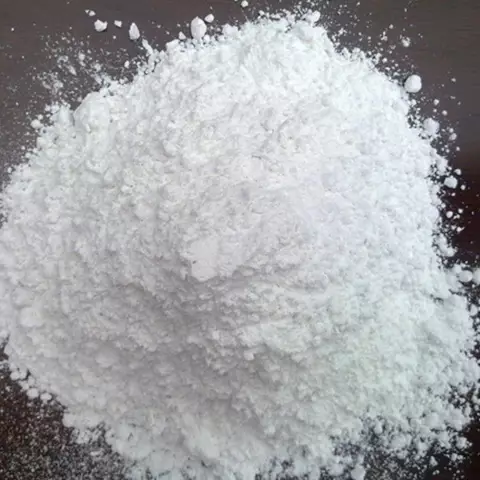- Author Rachel Wainwright [email protected].
- Public 2023-12-15 07:39.
- Last modified 2025-11-02 20:14.
Polyphosphate
Polyphosphates are phosphoric acid polymers that play an important role in the bioenergy of living cells.

Polyphosphates (food additive E452) belong to a special group of additives designed to form and maintain the consistency and shape of food products.
Phosphoric acid polymers are widely used in the food industry. In other industries they are used:
- To soften water;
- For fiber degreasing;
- As a corrosion inhibitor;
- As a component of synthetic detergents, as well as soaps and washing powders.
Properties of polyphosphates
Polyphosphates were first discovered in 1890 by the German biochemist L. Liebermann, who identified them in yeast cells, after which their structure, functions and biochemical transformations were studied.
The result of these studies was the identification of the properties of polyphosphates, as well as proof that high molecular weight polymers of phosphoric acid at different stages of development have important functions in the human body.
In the human body, polyphosphates are in the form of salts of various metal ions - calcium, magnesium, potassium and others. In cells, they regulate the level of various cations. They are also involved in platelet production and play an important role in blood coagulation.
Another property of polyphosphates is their low toxicity and the ability to form biologically important complexes.
The use of polyphosphates in the food industry
In industrial food production, the main purpose of polyphosphates, which are inhibitors and can slow down chemical reactions, is to maintain taste and prevent discoloration.
This property is related to the moisture binding capacity and buffer capacity, which are determined by the length of the polyphosphate chain and depend on the type of polyphosphate.
Food supplement E452 includes 5 types of polyphosphates:
- Sodium polyphosphate - E452 (I). Its formula is (NaPO3) n;
- Potassium polyphosphate - E452 (II). Its formula is K (n + 2) O (PO3) n;
- Calcium sodium polyphosphate - E452 (III). Its formula is (Ca, Na) (PO3) n;
- Calcium polyphosphate - E452 (IV). Its formula is CanPnO (3n + 1);
- Ammonium Polyphosphate - E452 (V). Its formula is (NH4PO3) n.
Depending on the type of product, the method of its preparation and the requirements for the storage duration, polyphosphates are used for different purposes - as catalysts, emulsifiers or stabilizers.
So, they are used in pickling vegetables, preserving meat products, in cheese making (as an emulsion stabilizer) and in the manufacture of quick-frozen foods (to retain moisture).

According to the existing hygienic regulations for the use of food additive E452 (ammonium polyphosphate, sodium polyphosphate, potassium polyphosphate) in Russia in the manufacture of products, its amount should not exceed:
- In bakery, flour and confectionery and products - 20 g / kg;
- In cream - 5 g / l;
- In sauces - 5 g / kg;
- In ice cream - 1 g / kg;
- In milk - 1 g / l;
- In pasta - 2 g / kg;
- In cheeses - 2 g / kg;
- In butter - 2 g / kg;
- In processed cheeses - 20 g / kg;
- In alcoholic beverages - 1 g / l;
- In margarine - 5 g / kg;
- In desserts - 3 g / kg.
Also, phosphoric acid polymers in the form of E452 are added to frozen fish and meat products, soups and broth concentrates, artificially mineralized drinks and specialized drinks for athletes, dry and instant teas, salt and salt substitutes.
The harm of polyphosphates
Despite the fact that the use of E452 (sodium polyphosphate, calcium-sodium polyphosphate, ammonium polyphosphate) is allowed in the EU and CIS countries, many studies confirm the harm of polyphosphates to human health.
If the norms for the use of the E452 additive in products are not observed, these compounds enter the body in quantities that significantly exceed the required ones, and can cause various disorders in the body.
Thus, the harm of polyphosphates is digestive disorders, which can cause vomiting and diarrhea.
Found a mistake in the text? Select it and press Ctrl + Enter.






